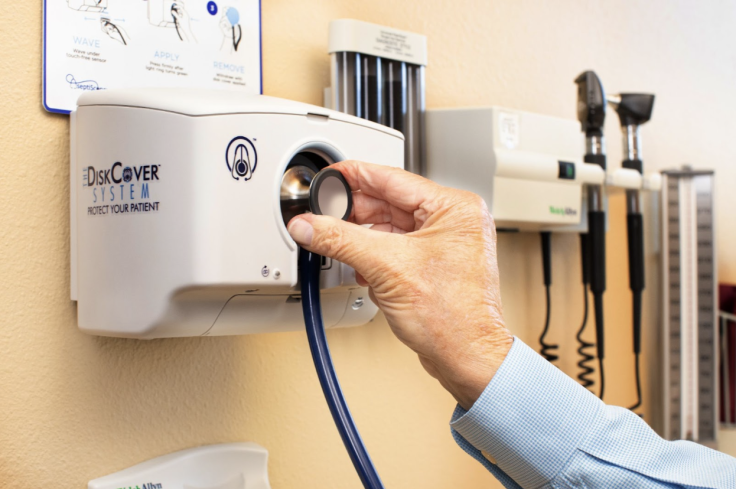In The War Against Dangerous Pathogens In Hospitals, Healthcare Providers Elevate Patient Safety With Simple Solutions

In the autumn of 2019, at the largest infectious disease forum in the US, a group of medical experts met to discuss the challenge of Healthcare Associated Infection (HAI), which each year takes the lives of 100,000 US patients and costs providers billions of dollars. "We need a new strategy to protect our patients," stated Frank Peacock, a widely published expert in infection control. and emergency medicine physician in Houston, Texas. Just a few months later, the world would come to a screeching halt with the greatest pandemic of the 21st century. Like all clinicians, Peacock would be thrown headfirst into a multi-year nightmare of long shifts, filled hospitals, and limited resources. The rest is of historical record.
Today, Frank Peacock still treats patients but is also the Chief Medical Officer at AseptiScope®, the company he co-founded with innovation experts who have produced novel solutions in areas like diabetes and cardiovascular disease for decades. "The greatest concern of HAI is that the bugs are winning" Peacock laments. Ever since the germ theory of disease became widely accepted in the late 19th century, clinicians have used various chemicals to kill pathogens, such as alcohol and antibiotics. However, these microorganisms are genetically diverse and are constantly evolving to survive against environmental pressures. This has led to the emergence of multidrug-resistant organisms, also known as "superbugs." "We can't wash our way out of this problem as these species learn to survive in the face of antimicrobials like alcohol. Recently, the CDC has elevated concerns that the stethoscope may be transmitting dangerous pathogens by touch between every patient. Touching US patients over 5 billion times a year, the stethoscope may be undermining patient safety. AseptiScope's innovative solution, The DiskCover® System, blocks stethoscope transmission without contributing to increasing pathogen resistance" explains Peacock.
AseptiScope CEO Scott Westhaver Mader uses a process he calls "Market-Driven Science," to identify critical attributes required to resolve unmet challenges in healthcare. "Superbugs take the greatest toll on human life, so fighting them requires technologies that address both immediate needs and long-term impacts," says Mader. "This touch-free technology provides clean patient contact, breaking transmission without evolving resistant species. Through the development of The DiskCover System, healthcare can win three battles in the war against microbes: improving patient safety, reducing the indiscriminate use of alcohol, and transitioning to sustainable technology."
Having completed their design, development, and validation programs, co-founder and Chief Operations Officer Kelly Powers has led the operationalizing of the company. The first touch-free stethoscope hygiene system, The DiskCover System, is now registered with the FDA and the company is licensed to manufacture. "As anticipated, each production lot is bigger than the last. Our goal now is to sophisticate our approach to manufacturing as we expand our customer base and prepare to scale production for healthcare providers across the nation, who now finally have a true solution to this problem," says Powers.
The company now has attracted the attention of leaders in the field, some of the largest healthcare providers in the U.S., and a growing number of community hospitals and clinics. Top experts in infection control and patient care have recently called on the CDC to elevate the guidelines for stethoscope hygiene to the same level as hand hygiene, referring to the stethoscope as "the clinician's third hand." The authorities in infection control and medicine broadly have understood the nature of the problem with stethoscope transmission, but they lacked a true solution for this problem. "Now that The DiskCover System has been validated and is in use around the country, these experts are energized about resolving these patient safety challenges that have been suspected for decades and are now understood to be very real", says Dr. Peacock. The CDC is issuing new 2024 guidelines designed to reduce the transmission of pathogens in healthcare, and with a completed framework requiring stethoscope hygiene between each patient encounter similar to hand hygiene.
"The DiskCover System is designed to block pathogen transmission while offering ease of use, workflow compatibility, sustainability, and a strong return on investment." continues Mader. "We conduct studies published in our online clinical library, along with data showing clinical satisfaction data in hospitals, clinics, and more."
AseptiScope, Inc. (www.aseptiscope.com) is a privately funded San Diego, California-based, clinical innovation portfolio company. AseptiScope, DiskCover, and associated logos are registered trademarks of AseptiScope, Inc.
© Copyright IBTimes 2024. All rights reserved.





















